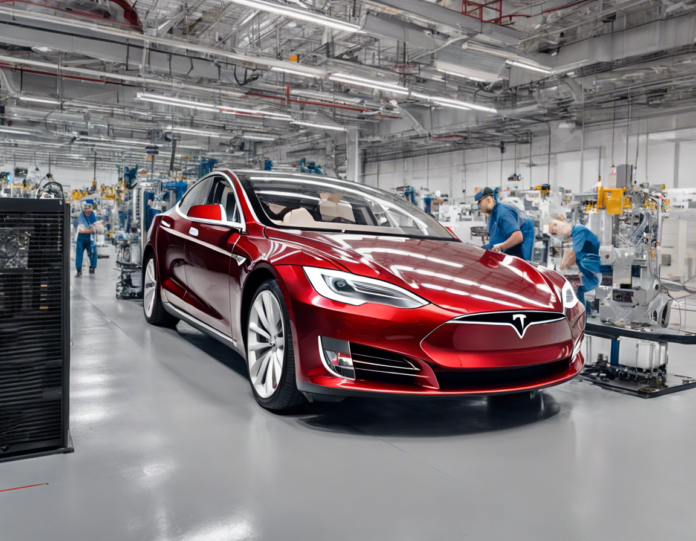In recent years, the automotive industry has witnessed a significant shift towards electric vehicles (EVs) as a response to the global push for sustainable transportation solutions. Companies like Tesla, with their innovative electric car models, have revolutionized the market and set new standards for performance and design. On the other hand, Tata Electronics, a prominent player in the Indian automotive sector, has been actively pursuing avenues to establish its presence in the EV market. The collaboration between Tesla and Tata Electronics holds the potential to bring together cutting-edge technology and manufacturing capabilities, creating exciting possibilities for the future of electric vehicles. Let’s delve deeper into this partnership and the impact it could have on the industry.
The Rise of Electric Vehicles
The automotive industry is undergoing a transformative phase with the rise of electric vehicles. With concerns over climate change and air pollution mounting, governments worldwide are incentivizing the adoption of electric vehicles through policy measures and subsidies. This shift towards EVs is not only driven by environmental concerns but also by advancements in battery technology and the declining costs of production.
Tesla, led by visionary entrepreneur Elon Musk, has been at the forefront of this revolution. Known for its sleek designs, cutting-edge technology, and long-range electric vehicles, Tesla has captured the imagination of consumers globally. The company’s focus on sustainability and innovation has propelled it to the position of a market leader in the EV segment.
Tata Electronics: A Key Player in the EV Market
On the other hand, Tata Electronics, a subsidiary of Tata Group, one of India’s largest business conglomerates, has been making strategic moves to strengthen its position in the electric vehicle market. Tata Motors, another subsidiary of the Tata Group, has already made significant strides in EV manufacturing with models like the Tata Nexon EV and the Tigor EV.
Tata Electronics, with its expertise in electronics manufacturing and access to Tata Group’s extensive resources, is well-positioned to leverage the growing demand for electric vehicles in India and beyond. The company’s focus on developing key technologies for EVs, such as battery management systems and charging infrastructure, reflects its commitment to sustainable mobility solutions.
The Potential of Collaboration
The collaboration between Tesla and Tata Electronics could potentially be a game-changer in the electric vehicle landscape. By combining Tesla’s advanced technology and design capabilities with Tata Electronics’ manufacturing prowess and market reach, the partnership could lead to the development of high-quality, affordable electric vehicles for the Indian and global markets.
One of the key areas where this partnership could make a significant impact is in the development of electric vehicle batteries. Tesla is known for its expertise in battery technology, demonstrated through its Gigafactories that produce high-performance batteries for its vehicles. By partnering with Tesla, Tata Electronics could gain access to state-of-the-art battery technology, enabling it to enhance the range and performance of its electric vehicles.
Furthermore, collaboration with Tesla could also help Tata Electronics improve its electric vehicle charging infrastructure. Tesla’s Supercharger network, one of the largest fast-charging networks globally, could serve as a model for expanding EV charging infrastructure in India. This could address one of the key concerns for potential EV buyers – the availability of convenient and fast charging facilities.
Opportunities for Innovation and Growth
Beyond electric vehicles, the collaboration between Tesla and Tata Electronics opens up opportunities for innovation in other sectors as well. Tesla’s expertise in energy storage solutions, demonstrated through products like the Powerwall and Powerpack, could complement Tata Electronics’ initiatives in renewable energy and grid modernization.
Moreover, the partnership could lead to the development of new mobility solutions, such as electric buses and commercial vehicles, catering to the growing demand for sustainable transportation options in urban centers. By leveraging each other’s strengths, Tesla and Tata Electronics could create a diverse portfolio of electric mobility solutions that address the evolving needs of consumers and businesses.
Conclusion
In conclusion, the collaboration between Tesla and Tata Electronics has the potential to significantly impact the electric vehicle market, not just in India but globally. By combining Tesla’s technological prowess with Tata Electronics’ manufacturing capabilities, the partnership could drive innovation, improve the affordability of electric vehicles, and accelerate the transition towards sustainable mobility. As both companies continue to explore opportunities for collaboration, the future of electric vehicles looks promising, with a blend of cutting-edge design, advanced technology, and environmental sustainability.
FAQs
1. What are the benefits of electric vehicles?
Electric vehicles offer numerous benefits, including reduced greenhouse gas emissions, lower operating costs, and a quieter driving experience.
2. How long does it take to charge an electric vehicle?
The time taken to charge an electric vehicle depends on the charger type and the vehicle’s battery capacity. Fast chargers can charge an EV to 80% in around 30 minutes.
3. Are electric vehicles more expensive to purchase than traditional vehicles?
While electric vehicles may have a higher upfront cost, they tend to have lower operating and maintenance costs over the vehicle’s lifetime, making them cost-competitive in the long run.
4. Where can I find electric vehicle charging stations?
Electric vehicle charging stations are becoming more prevalent in urban areas, shopping centers, and along highways. Various apps and websites provide real-time information on charging station locations.
5. What is the range of an electric vehicle on a single charge?
The range of an electric vehicle varies depending on the model and battery capacity. Modern EVs can have ranges anywhere from 100 to over 300 miles on a single charge.
